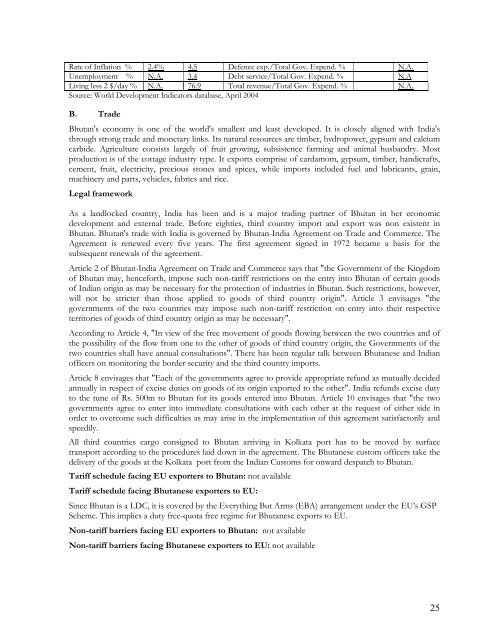Bhutan Country Strategy Paper 2007-2013 - the European External ...
Bhutan Country Strategy Paper 2007-2013 - the European External ...
Bhutan Country Strategy Paper 2007-2013 - the European External ...
You also want an ePaper? Increase the reach of your titles
YUMPU automatically turns print PDFs into web optimized ePapers that Google loves.
Rate of Inflation % 2.4% 4.5 Defence exp./Total Gov. Expend. % N.A.<br />
Unemployment % N.A. 3.4 Debt service/Total Gov. Expend. % N.A<br />
Living less 2 $/day % N.A. 76.9 Total revenue/Total Gov. Expend. % N.A.<br />
Source: World Development Indicators database, April 2004<br />
B. Trade<br />
<strong>Bhutan</strong>'s economy is one of <strong>the</strong> world's smallest and least developed. It is closely aligned with India's<br />
through strong trade and monetary links. Its natural resources are timber, hydropower, gypsum and calcium<br />
carbide. Agriculture consists largely of fruit growing, subsistence farming and animal husbandry. Most<br />
production is of <strong>the</strong> cottage industry type. It exports comprise of cardamom, gypsum, timber, handicrafts,<br />
cement, fruit, electricity, precious stones and spices, while imports included fuel and lubricants, grain,<br />
machinery and parts, vehicles, fabrics and rice.<br />
Legal framework<br />
As a landlocked country, India has been and is a major trading partner of <strong>Bhutan</strong> in her economic<br />
development and external trade. Before eighties, third country import and export was non existent in<br />
<strong>Bhutan</strong>. <strong>Bhutan</strong>'s trade with India is governed by <strong>Bhutan</strong>-India Agreement on Trade and Commerce. The<br />
Agreement is renewed every five years. The first agreement signed in 1972 became a basis for <strong>the</strong><br />
subsequent renewals of <strong>the</strong> agreement.<br />
Article 2 of <strong>Bhutan</strong>-India Agreement on Trade and Commerce says that "<strong>the</strong> Government of <strong>the</strong> Kingdom<br />
of <strong>Bhutan</strong> may, henceforth, impose such non-tariff restrictions on <strong>the</strong> entry into <strong>Bhutan</strong> of certain goods<br />
of Indian origin as may be necessary for <strong>the</strong> protection of industries in <strong>Bhutan</strong>. Such restrictions, however,<br />
will not be stricter than those applied to goods of third country origin". Article 3 envisages "<strong>the</strong><br />
governments of <strong>the</strong> two countries may impose such non-tariff restriction on entry into <strong>the</strong>ir respective<br />
territories of goods of third country origin as may be necessary".<br />
According to Article 4, "In view of <strong>the</strong> free movement of goods flowing between <strong>the</strong> two countries and of<br />
<strong>the</strong> possibility of <strong>the</strong> flow from one to <strong>the</strong> o<strong>the</strong>r of goods of third country origin, <strong>the</strong> Governments of <strong>the</strong><br />
two countries shall have annual consultations". There has been regular talk between <strong>Bhutan</strong>ese and Indian<br />
officers on monitoring <strong>the</strong> border security and <strong>the</strong> third country imports.<br />
Article 8 envisages that "Each of <strong>the</strong> governments agree to provide appropriate refund as mutually decided<br />
annually in respect of excise duties on goods of its origin exported to <strong>the</strong> o<strong>the</strong>r". India refunds excise duty<br />
to <strong>the</strong> tune of Rs. 500m to <strong>Bhutan</strong> for its goods entered into <strong>Bhutan</strong>. Article 10 envisages that "<strong>the</strong> two<br />
governments agree to enter into immediate consultations with each o<strong>the</strong>r at <strong>the</strong> request of ei<strong>the</strong>r side in<br />
order to overcome such difficulties as may arise in <strong>the</strong> implementation of this agreement satisfactorily and<br />
speedily.<br />
All third countries cargo consigned to <strong>Bhutan</strong> arriving in Kolkata port has to be moved by surface<br />
transport according to <strong>the</strong> procedures laid down in <strong>the</strong> agreement. The <strong>Bhutan</strong>ese custom officers take <strong>the</strong><br />
delivery of <strong>the</strong> goods at <strong>the</strong> Kolkata port from <strong>the</strong> Indian Customs for onward despatch to <strong>Bhutan</strong>.<br />
Tariff schedule facing EU exporters to <strong>Bhutan</strong>: not available<br />
Tariff schedule facing <strong>Bhutan</strong>ese exporters to EU:<br />
Since <strong>Bhutan</strong> is a LDC, it is covered by <strong>the</strong> Everything But Arms (EBA) arrangement under <strong>the</strong> EU’s GSP<br />
Scheme. This implies a duty free-quota free regime for <strong>Bhutan</strong>ese exports to EU.<br />
Non-tariff barriers facing EU exporters to <strong>Bhutan</strong>: not available<br />
Non-tariff barriers facing <strong>Bhutan</strong>ese exporters to EU: not available<br />
25

















